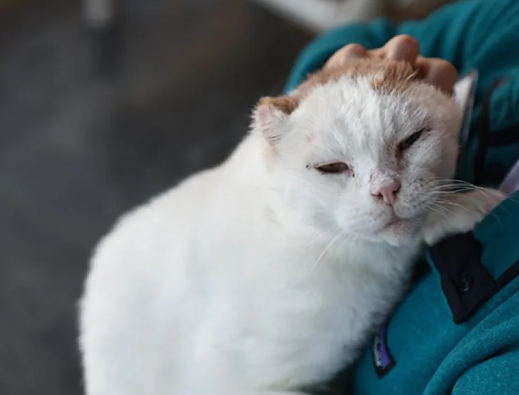Cancer in your cat - possible options

Uncontrollable cell development is what causes cancer. The kind of tissue cell that is impacted determines how quickly a cancer can spread and how serious of a sickness it can create. At some point in their lives, up to one in five cats may experience any of the numerous types of cancer. As one ages, there is an increased risk of cancer. This indicates that the number of animals with cancer has been rising recently, since cats are now able to enjoy longer life expectancies due to improved veterinary care.
What causes cancer?
As with human cancers, the causes of cancer in cats are still not well understood. Possible causes include:
- Toxic chemicals or exposure to harmful radiation.
- Feline Leukaemia Virus (a very common cause in cats).
- Abnormalities in the immune system that usually protects against infectious diseases.
- Abnormal genes.
How do I know if my cat has cancer?
malignancy symptoms can vary greatly and are dependent on the type of tissue cells affected, the location of the malignancy, and the disease's stage. Animals with advanced cancer may exhibit hunger decrease and weight loss. Your cat can be depressed, throw up, experience constipation or diarrhea, or develop a fever. Anaemia might also cause your cat to tire out rapidly.
Is my cat at risk of developing cancer?
Any animal can develop cancer at any age, but some cat breeds are more vulnerable to specific cancer kinds. Particularly on the ears, nose, lips, and any other location where the skin is exposed to direct sunlight, cats with white fur and sun-loving tendencies are susceptible to skin cancer. Sunscreen can help lower the chance of developing cancer by protecting exposed regions of white skin and hair on sunny days. The most frequent cause of cancer in cats is the feline leukemia virus, albeit not all cats infected by the virus will go on to have the illness. The majority of cats are immune to the virus, but those who are not will become permanently infected and three out of ten will get cancer of some kind.
Can cancer be treated?
It is possible to treat the majority of cancer types, albeit this will depend on the type of cancer and if the illness has spread. The way a treatment works can vary greatly. Treatment may, in certain circumstances, result in a full recovery or, at the at least, greatly extend or enhance your cat's life. The only compassionate option available when faced with a drawn-out, agonizing death is euthanasia.
There are three basic options for treating cancers, not all are appropriate for every case and sometimes a combination of treatments has the best chance of success. The treatment options are:
- Surgical removal - usually the best choice for most cancers of solid tissue. If the cancer is relatively benign or if a more malignant cancer has not yet spread to other parts of the body, surgical removal often produces very good results.
- Chemotherapy (drug treatment) - the best option for cancers affecting the blood or multiple areas of the body. Drug treatment may also prevent or delay the appearance of secondary tumours in other organs after surgical removal of the original lump. Chemotherapy in cats is used to improve quality of life in pets, and the side effects of chemotherapy seen in people are rarely experienced.
- Radiotherapy (x-rays) - often effective when tests have shown clearly the extent and size of the tumour. The radiation is usually delivered by a special machine in a radiotherapy unit. A beam of radiation is most effective on cancers of the extremities (such as the limbs and head) where it is less likely to damage normal tissue before reaching the tumour. Radiotherapy units are only located in a few specialised centres and your vet would need to refer you to a cancer specialist for this form of treatment. In some cases it may be possible to treat the cancer by injecting radioactive material into the body.
-
Immunotherapy harnesses the cat's immune system to target and destroy cancer cells. Immunotherapies, such as vaccines and antibody treatments, can stimulate the cat's immune response against the cancer cells. These treatments are continually evolving and hold promise for more effective and targeted cancer treatments in the future.
-
Palliative Care. In cases where the cancer is advanced and a cure is not possible, palliative care focuses on managing the cat's symptoms and providing comfort. Pain management, nutritional support, and medications to alleviate discomfort are essential components of palliative care. Maintaining a good quality of life and ensuring the cat is pain-free become the primary goals.
Will my cat be in pain?
While most cancer-related pain can be managed, considerable discomfort can occur in cases of advanced malignancy. Your veterinarian will likely start with a mild analgesic and progress to stronger medications if necessary. If your cat is in pain, your veterinarian will work to alleviate its suffering rather than try to extend its life.
Is diet important?
Your cat's quality of life may be enhanced by paying close attention to its diet. In order to deal with the symptoms of a rapidly expanding tumor, cats require extra food; nevertheless, many cancer sufferers lose weight due to weak appetites. You could try hand feeding your cat or warming the food to encourage them to eat. Even if your cat doesn't eat much, there are specific diets made for animals with cancer that nevertheless provide them a healthy diet.
Wet diet are prefered than dry food. You can supplement with many nutrient known has any effects on cancer like omega 3, turmeric, etc
How long will my cat live?
Every owner wants an answer to this question, but just like with human cancer, your veterinarian is unable to provide you with a confident response. In addition to the kind and stage of the illness, your cat's overall condition will determine its chances of survival. To jointly determine the best course of action for your cat's care, you should talk about this matter with your personal veterinarian. It makes sense that, upon receiving a cancer diagnosis, you would be terrified for your pet's future. Talking to your veterinarian about your concerns is the best way to get reassurance and an unbiased opinion that you are acting in your pet's best interests.



